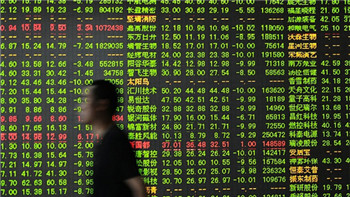(单词翻译:单击)

If China hopes to calm the turmoil that has shaken financial markets at home and around the world, and to steer its economy to a soft landing, it must reform its regulatory policymaking regime.
如果中国想要平息震撼了国内和全球金融市场的市场动荡,引导经济走向软着陆,就必须改革其监管政策制定体制。
The government itself is a significant source of instability and uncertainty. China needs more professional policymaking to restore confidence, which is possible only if Beijing stops intervening in markets arbitrarily and allows regulators independent oversight.
中国政府本身就是不稳定和不确定性的重要来源。中国需要更专业的政策制定方式来恢复人们的信心,而这只有在中国政府停止随意干预市场并允许监管机构独立监督之后才成为可能。
By now almost everyone is familiar with two agencies: the seemingly careless China Securities Regulatory Commission and the uncommunicative People’s Bank of China . During China’s dramatic stock market crash in June and July last year, the CSRC was busy changing rules on the fly: limiting stock index futures trading, banning short selling, cutting margin ratios, locking up the holdings of large shareholders and then investigating for potential legal actions short-sellers and those selling off big blocks. These hasty rule changes, imposed for the immediate convenience, created much uncertainty for investors.
到目前为止,差不多所有人都熟悉中国的两大机构:看上去随意草率的中国证监会(CSRC)和沉默寡言的中国央行(PBoC)。在去年6月和7月中国股市急剧崩盘期间,中国证监会在忙着随时随刻更改规则:限制股指期货交易、禁止做空、降低保证金比例、禁止大股东减持,还对做空者和大宗股票卖出者开展调查,以采取可能的法律行动。这些出于一时方便而对规则仓促做出的改变,给投资者带来了许多不确定性。
On January 4, the first working day after the New Year break, the CSRC introduced the two-step circuit breakers — to pause trading when stock indices were down 5 per cent and to close for the day if the fall reached 7 per cent. Unfortunately, the circuit breakers were needed right away as the market plunged within a few hours of opening. They were triggered again on January 7, this time with trading closed just 15 minutes after opening. That very evening, just four days after introducing the mechanism, the CSRC killed it.
1月4日是元旦假期后的第一个工作日,当天中国证监会引入了两级熔断机制,即当股指下跌5%时暂时停盘,而当跌幅达到7%时则当天闭市。不幸的是,由于股市在开盘几小时内就出现暴跌,两级熔断机制马上就发挥了作用。而在1月7日它们再次被触发,这一次开盘仅15分钟就闭市了。就在当天晚上,也就是该机制引入仅仅4天后,中国证监会暂停了这一机制。
Since the PBoC seldom communicates with the market, its actions are often misunderstood. For example, in August last year it reformed the mechanism for setting the renminbi exchange rate. Whereas the PBoC would previously give a morning fix with no link to the market rate, it now based the morning fix on the previous day’s closing rate on the onshore renminbi market.
而由于中国央行很少与市场沟通,该行的举措经常会被人误解。比如,去年8月中国央行改革了人民币汇率形成机制。过去,中国央行会在每天早晨设定一个与市场汇率没有关系的人民币汇率中间价。如今,该行却会根据前一天在岸人民币市场收盘汇率,设定每天早晨的人民币汇率中间价。
It was a good reform, intended to signal that Beijing was still pushing market-orientated reforms despite arbitrary interventions in the stock market. However, the outside world interpreted that step as China intending to devalue the renminbi because of worse-than-expected troubles in the economy, resulting in heavy selling of the renminbi and risky assets across global markets.
这是个不错的改革举措,意在释放一种信号,即尽管中国政府在随意干涉中国股市,它却仍在推动市场化改革。然而,外界对这一举措的解读,却是中国由于经济困境糟于预期而有意让人民币贬值。这一解读导致全球市场出现了对人民币和高风险资产的大举抛售。
In December, the PBoC introduced a renminbi index based on a basket of currencies but left the market to guess at its intentions. After the New Year, the guessing game intensified as the PBoC seemed to allow the renminbi to depreciate for days, leading to further confusion and intensified selling pressure across markets.
去年12月,中国央行引入了基于一篮子货币的人民币汇率指数,却让市场自己猜测其意图。新年之后,中国央行似乎放任人民币连续多日贬值,令这种猜测游戏愈演愈烈,导致人们的困惑进一步加深,增大了整个市场的抛售压力。
So does the Chinese government lack competent people, as many have concluded? The answer is no. For those of us who have dealt extensively with these organisations, it is no secret that the PBoC and CSRC are among the most competent agencies in Beijing. From top to bottom, they are staffed by well educated (often western educated) highly experienced professionals.
那么,是不是中国政府像许多人断定的那样,缺少能干的人士?答案是否定的。对于我们当中与这些机构打过密切交道的人来说,中国央行和中国证监会属于北京最能干的机构并不是秘密。从上到下,他们的工作人员都是受过良好教育(往往是西方教育)、拥有丰富经验的专业人士。
The problem lies instead in these policymaking bodies’ lack of independence. In the US, the Federal Reserve has full authority to decide on monetary and banking policies, and the Securities and Exchange Commission has autonomy on securities market matters.
实际上,问题在于这些政策制定机构缺乏独立性。在美国,美联储(Fed)拥有决定货币政策和银行业政策的全部权力,美国证交会(SEC)对证券市场的事务也有自治权。
By contrast the PBoC and CSRC cannot announce major, or sometimes even minor, policy decisions without the approval of the State Council, the state’s highest administrative body.
相比之下,没有政府最高行政机构国务院的批准,中国央行和证监会无权公布重大政策决定——有时甚至连较小的政策决定都无权公布。
Within the State Council, it is the premier and four vice-premiers who ultimately decide on all proposals submitted by the PBoC, CSRC and other agencies. While they are all exceptionally gifted and well educated, they should not be expected to be experts on every policy matter.
而在国务院内部,对中国央行、中国证监会和其他机构提交的所有提案作出最终决定的,是总理和四位副总理。虽然他们全都拥有极高才华,也受过良好教育,但人们不能指望他们是所有政策事务上的专家。
In the past, this mattered less. China lacked even a commercial banking sector, to say nothing of sophisticated capital and currency markets. For agriculture and traditional industries, the absence of independent economic policy agencies was probably manageable.
在过去,这一点没那么重要。当时的中国甚至没有商业银行部门,更不必说复杂的资本和货币市场了。而对农业和传统工业来说,缺乏独立的经济政策机构也许还行得通。
In the past two decades, however, the economy has become much more complex: many banks, big and small; markets in stocks, bonds, futures, options and other derivatives, and mutual funds, hedge funds, trusts and insurance industries, all developing rapidly. It is no longer realistic to expect one or two individuals to know it all and to be able to judge every policy matter.
然而,在过去二十年里,中国经济的复杂程度已大大增加:大大小小的众多银行,股市、债市、期货市场、期权市场及其他衍生品市场,以及共同基金、对冲基金、信托和保险行业,全都处于迅猛发展之中。指望一两个人无所不知、并能对所有政策事务做出判断不再现实。
To restore confidence and minimise turmoil, China needs to reform and ensure independence for the PBoC, CSRC and other policy bodies. Let experienced professionals take charge of the financial markets.
要想恢复人们的信心并将动荡降至最低,中国必须开展改革,确保中国央行、证监会和其他政策机构的独立性。让有经验的专业人士掌管金融市场吧。


